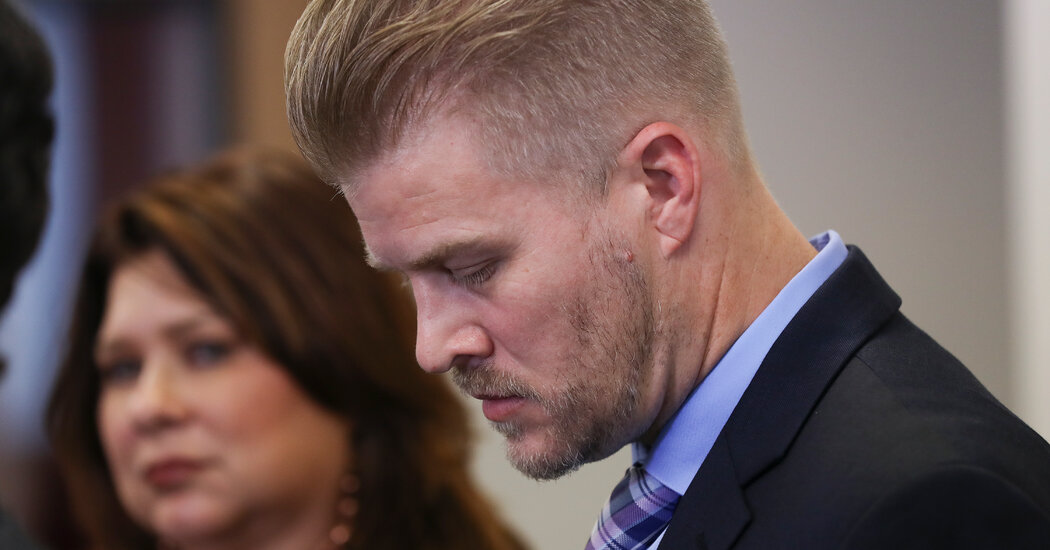Patrick Baker’s family hosted a fund-raiser for the former governor, Matt Bevin, before he was pardoned in 2019. He was convicted by a federal jury this summer and sentenced to 42 years in prison.
A Kentucky man who was pardoned by the state’s former governor in 2019 was sentenced to 42 years in prison this week on federal charges for the same murder, the Justice Department said.
Federal officials were able to put the man, Patrick Baker, 43, on trial for a second time under the dual sovereignty doctrine, which allows defendants to be prosecuted for the same crime in both federal and state court.
The case came under scrutiny after The Courier-Journal of Louisville, Ky., reported that Mr. Baker’s brother had hosted a fund-raiser at his home for the governor, Matt Bevin.
“The judge found that the separate-sovereigns doctrine applied to this case,” Gabrielle Dudgeon, a spokeswoman for the U. S. attorney’s office for the Eastern District of Kentucky, said on Wednesday, a day after Mr. Baker was sentenced. “Very basically, it states that the state government and federal government are separate sovereigns, each with their own laws and ability to prosecute.”
Posing as a United States marshal, Mr. Baker killed Donald L. Mills Jr. during a home invasion in May 2014, the U.S. attorney’s office said. Mr. Mills’s wife and children were held at gunpoint while Mr. Baker ransacked the home for oxycodone pills, the office said.
A Knox Circuit Court jury found Mr. Baker guilty in 2017 of reckless homicide, robbery in the first degree, impersonating a peace officer and tampering with physical evidence, court documents show. He was sentenced to 19 years in prison.
In December 2019, Mr. Baker received a pardon from Mr. Bevin, Kentucky’s governor at the time. The pardon was one of hundreds that Mr. Bevin, a Republican, issued in his final days in office after losing a re-election bid.
After the pardons were made public, lawmakers called for investigations and prosecutors complained that neither they nor the victims’ families had been notified. While a majority of the people freed by Mr. Bevin were serving time for low-level drug offenses, at least a few had been convicted of violent crimes.
Among them was Mr. Baker, whose family hosted a fund-raiser for Mr. Bevin that raised more than $21,000 in 2018, according to The Courier-Journal, which won a Pulitzer Prize in 2020 for its reporting on the pardons.
A federal grand jury indicted Mr. Baker in May 2021, and a jury convicted him in August on a federal charge of murder committed during a drug trafficking crime, finding that he had unlawfully caused the death of Mr. Mills by using a firearm during a robbery or kidnapping.
Mr. Baker will receive credit for the two and a half years he previously served in state prison, according to the Justice Department. He was sentenced on Tuesday in United States District Court for the Eastern District of Kentucky.
Patrick Renn, a lawyer who represented Mr. Baker, said on Wednesday that an appeal would be filed. “Under dual sovereignty, the federal government does have jurisdiction,” he said. “But it does not happen often.”
The federal charges against Mr. Baker “came completely out of the blue,” Mr. Renn said.
“The Justice Department believed that in order to fully punish the acts that they believe Mr. Baker caused, they should pursue the case federally, even after the pardon,” he said.
Evidence supporting the conviction of Mr. Baker was “sketchy at best,” according to an executive order written by Mr. Bevin. Mr. Baker, he wrote, had “made a series of unwise decisions in his adult life,” and “his drug addiction resulted in his association with people that in turn led to his arrest, prosecution and conviction for murder.”
Mr. Bevin defended his pardons on Twitter after they were issued in 2019, writing that his process was fair and thorough. Any suggestion that financial or political considerations played a role in his decision-making process was “highly offensive and entirely false,” he wrote.
In June, the F.B.I. said it was investigating Mr. Baker’s pardon.































